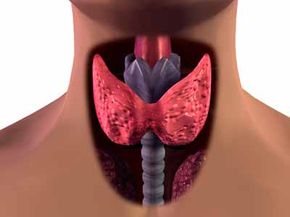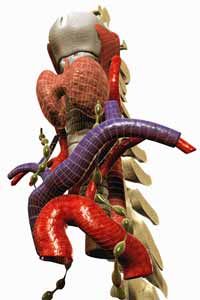Chances are rather good you've heard the news that you have a thyroid -- but chances are also pretty decent you're not completely up to speed on exactly why you have one.
The human body operates like a complex factory, and like any factory, there's lots of assembly lines, machines and moving parts, not to mention all the workers going about their business.
Advertisement
The thyroid plays an important role in all this activity; it has something of a managerial position. Without the thyroid bossing everybody around, lots of work around the plant wouldn't get done -- or at least wouldn't be up to quality standards. Don't go thinking the thyroid is the top dog, however. It gets its marching orders from the pituitary gland, which in turn answers to the part of the brain called the hypothalamus. But instead of memos to conduct all this communication, the body uses hormones.
If you're a teenager, you probably wish everybody would just shut up about hormones, but they're vital for the body to function properly. In general, hormones are molecules that signal the cells of the body to perform certain actions. A variety of hormones are produced in the various glands around the body; some of them affect many types of cells and others are more specialized.
But before we get into all that medical mumbo jumbo, let's take a step back for a second. Can you point to your thyroid? Need a hint? Thyroids are located in peoples' throats right below the larynx (also known as the voicebox), although in very rare instances they can migrate while a person is in fetus-mode. If that happens, the person ends up with his or her thyroid by the back of his or her tongue or all the way down in his or her chest. Assuming your thyroid made the trip all right, it should have set up camp right in front of the trachea (commonly called the windpipe). Shaped a bit like a butterfly's wings, the thyroid has two lobes that curl around the trachea connected by a narrow isthmus (think of the strip of land split by the Panama Canal).
It usually weighs in at less than an ounce, but it sure can pack a punch when it comes to your health. Want to find out if your thyroid's doing all right in the ring? Go to the next page to learn the basic operations of this glorious gland.
Advertisement


